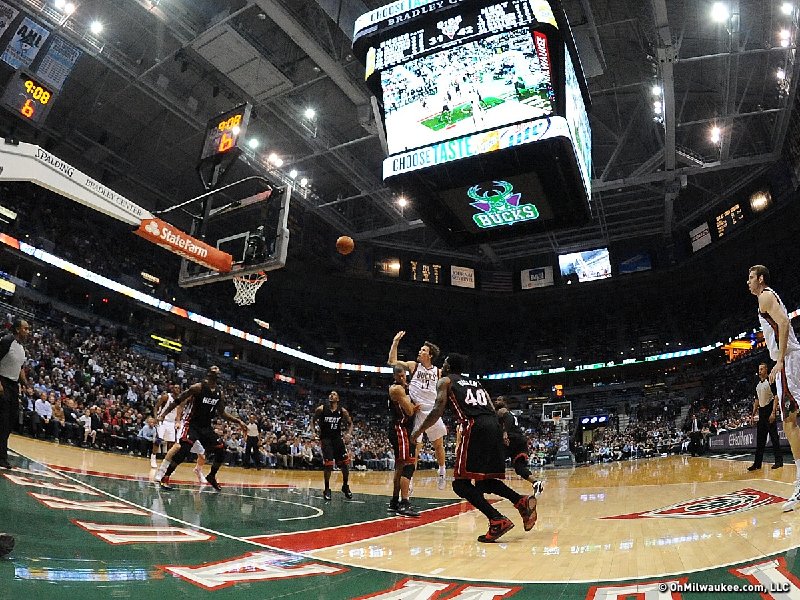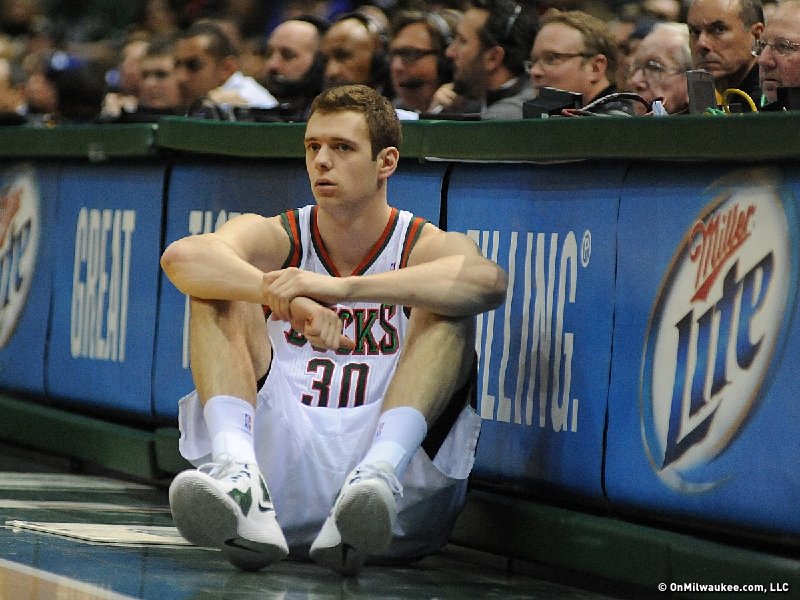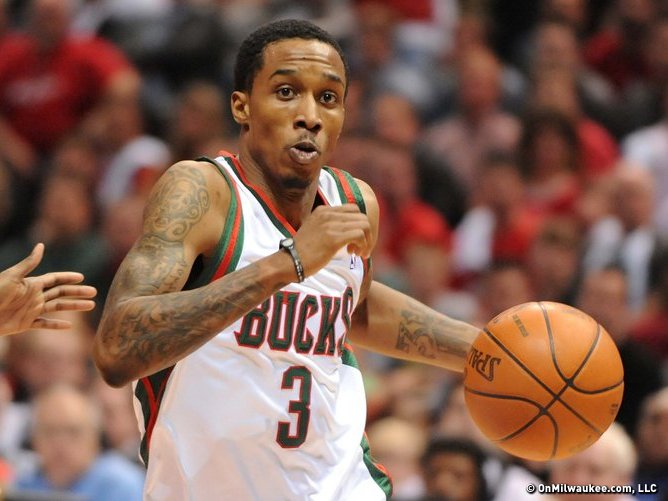It is almost a dirty word. "Front-runners."
You know, the kind of fan that goes to games, paints his face, and is all-in on the local team ... but only when they are good. You know. That guy.
But what if that guy ... is us?
Over the course of the last several months, there have been some well-intentioned journalists and leaders in our community that have pointed out the economic reality that the Bradley Center, by NBA standards, is outdated and in need of replacement in order for the Bucks to remain in town.
"Let 'em leave!" howls one so-called fan.
"I'd rather have a NHL team anyway!" cries another.
"They never win, so what is the point?" gets repeated over and over and over.
Before we really get started, we have to begin today's column with three un-debatable truths.
First of all, the economics of the NBA tell us that the life of the Bradley Center as a viable revenue stream for any franchise is about at the end of its useful life. Forbes Magazine recently valued the Bucks dead-last among all 30 teams in the league. Again. The biggest reason is they now play in the oldest arena in the NBA* with no current plans on the table to upgrade.
Note: The Bradley Center opened in the fall of 1988, as did the Palace of Auburn Hills (Pistons) and Power Balance Pavilion (Kings). The two arenas that opened their doors prior than 1988 are Madison Square Garden (Knicks) and Oracle Arena (Warriors), both of which have undergone a compete refurbishing in the time that the Bradley Center has been open.
Secondly, no NHL team is going to move into a 25-year old arena if the Bucks do leave. I honestly do not know what the thought process among fans is thinking that because the Bradley Center is outdated for the NBA, it's perfectly fine for the NHL. To quote Ron Burgundy, "that doesn't even make sense."
Thirdly, if the Bucks do leave Milwaukee, there will never, ever be another NBA team to come here. Why would they without a suitable arena already in place? Furthermore, if the Bucks do leave, without a NBA team to inhabit the building, there is no way city, county, and state leaders will be progressive enough to build the state-of-the-art facility that the city needs to remain big league. It is unrealistic to think anything else.
Remember (quoting Dave Begel), "Major league is major league. Everything else isn't."
Which brings me to yesterday's column regarding Stephen Jackson.
Predictably, every time the Bucks are discussed in the local media today whether in print or on the radio, the overwhelming reaction is not that of frustration or even disgust. And then, rather than get upset about it, Bucks fans did the worst possible thing a fan can do. Not get angry; not call up local talk shows and rant and rave; not write threatening talkbacks or letters to the editor.
The worst thing any fan can do is not care. After all, the opposite of love isn't hate. The opposite of love is apathy.
Considering the lack of success over the last quarter-century the Bucks have had, one might expect fans to call for heads to roll. After all, during the 1970s and through the mid '80s, Milwaukee really was a basketball town. The Bucks were consistently one of the top teams in the Eastern Conference and even Marquette was still one of the best college programs in the country.
And then the losing started. The fan base that had watched Kareem and Oscar; then Marques and Lanier; then Sidney and TC began to erode. Crowds got smaller and smaller at the Bradley Center, save for two magical runs.
In 2001, the Bucks came within one game of the NBA Finals. Then, just two years ago, they shocked the basketball world by finishing 10 games over .500, and lost in the first round in seven games to Atlanta, in no small part because of Andrew Bogut's late season injury.
In neither case, the Bucks were able to sustain or build upon their fleeting success.
It was not that long ago that the Brewers were in the mess the Bucks find themselves in today. In the mid-1990s, County Stadium was in terrible disrepair and needed replacement. The Brewers as a team were horrible and so was attendance at their games. For many that did not favor public dollars building Miller Park, there was apathy about baseball in Milwaukee.
But Miller Park got built, albeit after cutting through enough red tape to stretch from City Hall to the moon and back. After some lean years in their new stadium and under new leadership in the baseball department, fans began streaming through the turnstiles to the point of 3 million-plus season attendance marks being the norm.
The mathematical equation is pretty simple: Good team = fannies in the seats.
But that's not the case in Green Bay with the Packers. Nor is it the case with the Cubs, Bears, or Bulls in Chicago. Nor is it the case with the Cardinals in St. Louis. All of these teams have had down years and yet their fans have been there to show their support through thick and thin.
So that begs the question: Is Milwaukee a "front-runner" sports city?
"I think every city is to a degree," according to Adam Rygg of Port Washington. We don't always notice it due to more and/or sustained success. Milwaukee supports poor teams like good teams, but only for so long before growing apathetic."
Longtime soccer executive Peter Wilt, a former president of the Wave, agrees to an extent. "All cities are front runners to a degree," Wilt says. "Southern markets with high transient populations are more front runners than Milwaukee."
To Wilt's point, this is true. Cities such as Miami and Atlanta are notorious for not supporting their teams even when they are good. Sun Life Stadium almost never sells out for even Dolphins games anymore in Miami; the Braves routinely have thousands of empty seats even for playoff games.
In Phoenix this past October, Brewers fans were stunned to find cheap seats for the Brewers – Diamondbacks NLDS games at Chase Field, which still had roughly 10,000 empties for Game 4.
So at least Milwaukeeans come out and show their support for winning teams. But does that qualify us as being a "front-runner" town?
"Definitely," according to Grafton's Scott Wilterdink, who adds that may just be human nature at work. "The Bucks are only close to a sellout against marquee teams. Marquette can't even draw 11,000 for most Big East games. And the Brewers draw three million fans thanks to great promotions and deals. But honestly, what city isn't full of fair weather fans?"
"Absolutely," Milwaukee's Shaun Nelson agrees. "The Bucks finished 23rd in attendance last year, but had great numbers down the stretch as they vied for the No. 8 seed (in the playoffs)."
"(This is) 200 percent a front-runner town," according to Nick Poblocki of Sussex. "In 2001, you wouldn't see an empty seat at the BC for the Bucks. Now, you can get tickets to seven bucks on certain nights."
Shelly O'Rourke of Pewaukee says that if we are fair weather fans, it's not necessarily our fault as a fan base. After all, if we just keep going to games and spending our money, what is the intrinsic incentive for our teams to try to do better?
"I feel that the fans have to feel that the management of the team is doing something to try to improve the team," O'Rourke says. "If doing nothing but hope for the best year after year fans won't support that."
But can there be parallels drawn between the Brewers of the mid '90s and the Bucks of today?
"Bucks fans will always be considered front-runners," according to Pewaukee resident Mike Schmidling. "In the '80s when we were winning division titles, everyone came out. In 2001, going to the East Finals, everyone came out. Any sign of losing or dysfunction like this year, and the attendance reflects it big time. Having said that, the NBA is a bad product overall with very few teams having a chance at succeeding from season to season, and the recent lockout did absolutely nothing to change that. This has always been a baseball town, but having said that, the Brewers need to win in order to keep the fans coming."
So the bottom line, in a very unscientific survey of Milwaukee sports fans, we may indeed be a front-runner town. What is surprising is that so many are willing to admit something that most would not consider particularly flattering.
If there is one overwhelming argument as to how that mentality can be dangerous, look no further than the example of the Seattle Sonics. Their fans thought the team would never leave because of all the history their franchise had. A threat to move was just a big bluff.
That team is now called the Oklahoma City Thunder. And Seattle would do anything to have their beloved (yet neglected) team back.
If the Brewers never got Miller Park built, they may very well be in Washington. Or Charlotte. Or Louisville. But they wouldn't be playing at County Stadium.
Even though many here in town didn't care at the time, what would your summer have been last year without them, watching them win a division championship somewhere else?
We may be front-runners. But don't let that mentality cloud your judgment when it comes to the long-term future of the Bucks. They need this city now more than ever. Yes, they have to do their part and win. But if a front-runner mentality is allowed to permeate, the Bucks might just leave for greener pastures.
After all, there is a city in the Pacific Northwest that would love to have them.
Doug Russell has been covering Milwaukee and Wisconsin sports for over 20 years on radio, television, magazines, and now at OnMilwaukee.com.
Over the course of his career, the Edward R. Murrow Award winner and Emmy nominee has covered the Packers in Super Bowls XXXI, XXXII and XLV, traveled to Pasadena with the Badgers for Rose Bowls, been to the Final Four with Marquette, and saw first-hand the entire Brewers playoff runs in 2008 and 2011. Doug has also covered The Masters, several PGA Championships, MLB All-Star Games, and Kentucky Derbys; the Davis Cup, the U.S. Open, and the Sugar Bowl, along with NCAA football and basketball conference championships, and for that matter just about anything else that involves a field (or court, or rink) of play.
Doug was a sports reporter and host at WTMJ-AM radio from 1996-2000, before taking his radio skills to national syndication at Sporting News Radio from 2000-2007. From 2007-2011, he hosted his own morning radio sports show back here in Milwaukee, before returning to the national scene at Yahoo! Sports Radio last July. Doug's written work has also been featured in The Sporting News, Milwaukee Magazine, Inside Wisconsin Sports, and Brewers GameDay.
Doug and his wife, Erika, split their time between their residences in Pewaukee and Houston, TX.







